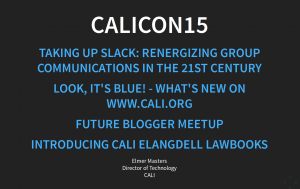- Kantree | Multi-level, fully customizable kanban boards http://t.co/FCgWKlkSjE 08:10:25, 2015-06-08
- RT @caliorg: #CALIcon15 Session of the Day: Active Learning in the Law School Classroom http://t.co/k9yHgNQBO0 09:51:26, 2015-06-08
- Some insight on separating professional and personal tech. Hint: it's important. http://t.co/BhVU9zhkG6 via @legalit 11:39:18, 2015-06-08
- RT @tim_baran: We have a problem with lawyers: This is how we fix law school and the legal profession – Deborah L. Rhode for @Salon http://… 11:51:34, 2015-06-08
- Apache Solr 5.2.0 and Reference Guide for 5.2 available http://t.co/a9rQI6NbV8 12:15:35, 2015-06-08
- Reading: Build a personalized schedule for #CALIcon15 http://t.co/DLS7cGIFIi by @caliorg 14:08:12, 2015-06-08
- My Twitter Digest for 06/07/2015 http://t.co/AaV5kolVmo 15:31:04, 2015-06-08
- RT @davewiner: The ad Apple ran the day IBM introduced its PC in 1981. http://t.co/U0YIMLMwmH 17:31:06, 2015-06-08
My Twitter Digest for 06/07/2015
- My Twitter Digest for 06/06/2015 http://t.co/MlKvh1l2td 15:30:14, 2015-06-07
- Serving multiple #CALIcon15 presentations with reveal.js http://t.co/Wwsn1w8Iec http://t.co/0Ovo7oStFA 23:39:11, 2015-06-07
Apache Solr 5.2.0 and Reference Guide for 5.2 available
Apache Solr 5.2.0 and Reference Guide for 5.2 available https://lucene.apache.org/solr/news.html
Kantree | Multi-level, fully customizable kanban boards
Kantree | Multi-level, fully customizable kanban boards https://kantree.io/
Serving multiple #CALIcon15 presentations with reveal.js
I have 4 sessions to present at CALICon15 this year and that means a lot of slides. Over the past few years I’ve tried a number of different approaches to putting together presentations including using outlines, wikis, AsciiDoc with deck.js, even plain old web pages. This year I’m giving reveal.js a try.
Reveal.js is a framework for easily creating beautiful presentations using HTML. It includes a lot of really handy features including speaker notes and a multiplexing plugin that allows viewers to follow a guided version of the presentation. The full installation gives me a nice node.js infrastructure that serves the slides and all I need to do is write an HTML file for each presentation.
Of course the basic installation instruction show you how to grab the code, then create and serve a single presentation. Even though I’m using git for versioning, I didn’t want to keep up 4 separate repos or even branches of code. I want to have all the HTML for the presentations in a single directory, in a single repo. I needed to figure out how to serve up multiple presentations from a single reveal.js installation.
It turns out there is a quick way to do this. I copied the included index.html to sample.html, for future reference and edited index.html into a single slide that links to 4 other html files. Each of the other files contains one presentation. This gives me a single code base for all the presentations and easy access to all of the features of reveal.js.

For my next step I’m going to give the multiplexing feature a try so folks can follow along. I think that there a lot of potential here for law schools to make use of this sort of tech in the classroom. Fast presentations that are shared directly with students would be something worth looking into.
My Twitter Digest for 06/06/2015
- Skype for Web rolls out to all users in the U.S. and U.K., launching worldwide in the next few weeks | VentureBeat http://t.co/nnkl4cpYxp 07:09:15, 2015-06-06
- My Twitter Digest for 06/05/2015 http://t.co/YtOsingG8y 15:30:10, 2015-06-06
- Overstock Will Issue a Private Bond Powered by Bitcoin Tech | WIRED http://t.co/9b2ooVk72b 20:56:38, 2015-06-06
- Martin Brinkley ’92 Chosen as 14th Dean of UNC-Chapel Hill School of Law http://t.co/lltmKqwxSD 21:41:24, 2015-06-06
- SamplerBox – turn a raspberry pi into a midi sampler http://t.co/ana4TIwXuK 21:58:23, 2015-06-06
- Annotation Service Genius Rolls Out An API With Instapaper As Its Debut Partner | TechCrunch http://t.co/Fnuo464PaJ 22:41:45, 2015-06-06
- reveal.js – The HTML Presentation Framework http://t.co/lRkV0QdlWV 23:13:22, 2015-06-06
reveal.js – The HTML Presentation Framework
reveal.js – The HTML Presentation Framework http://lab.hakim.se/reveal-js/#/
Annotation Service Genius Rolls Out An API With Instapaper As Its Debut Partner | TechCrunch
Online annotation platform Genius, which originally began as a way to mark up rap lyrics before expanding to support any page on the web, is now making its service – including its collection of annotations and musical metadata – available to third-party developers for use in their own applications. The first partner to take advantage of the new API is Betaworks, which integratedGenius with Instapaper’s new Notes feature, launched yesterday.
In Instapaper, the Notes feature allows users to select a snippet of text from an online article and then make comments next to that text. By default, those annotations are private, but users can choose to share them through Twitter’s textshot feature, or through other third-party applications, like Facebook, Evernote, Tumblr, and more.
Annotation Service Genius Rolls Out An API With Instapaper As Its Debut Partner | TechCrunch http://techcrunch.com/2015/06/05/annotation-service-genius-rolls-out-an-api-with-instapaper-as-its-debut-partner/
SamplerBox – turn a raspberry pi into a midi sampler
SamplerBox – turn a raspberry pi into a midi sampler http://www.samplerbox.org/home
Martin Brinkley ’92 Chosen as 14th Dean of UNC-Chapel Hill School of Law
Martin Brinkley ’92 Chosen as 14th Dean of UNC-Chapel Hill School of Law http://www.law.unc.edu/news/2015/06/05/martin-brinkley-92-chosen-as-14th-dean-of-unccha/
